- Home
- Richard Dawkins
An Appetite for Wonder Page 8
An Appetite for Wonder Read online
Page 8
My first term, in Form II, I was taught by Miss Long, a thin, angular lady of middle age with straight hair and rimless glasses, very kind like most of the teachers. Apart from Form II, she mainly taught the piano. Indeed, my first music lessons were with her, and I boasted to my parents that my progress was much faster than it was. Since the truth was sure to emerge eventually, what was the point of such boasting? I shall never know.
It became apparent that, if my parents had been pessimistic about the academic standards of Eagle in Southern Rhodesia, they were wrong. I had been only average among my contemporaries at Eagle, but found myself well ahead when I first arrived at Chafyn Grove. Embarrassingly so, to the extent that, since academic ability was not admired, I would pretend to know less than I did. Asked for the meaning of a Latin or French word, for example, I would pretend to um and er uncertainly, rather than instantly show what I knew and risk losing face with my peers. This tendency became positively illogical the following year in Form III, when I foolishly decided that, since the muscle boys who were good at games were mostly not very good academically, the only way for me to become good at games was to perform poorly in class. Actually, now that I think about it, that attitude was so stupid it’s pretty self-evident that I didn’t deserve to do well in class anyway.
I was evidently very confused about what it meant to be good at games. There were three brothers, Sampson ma, Sampson mi and Sampson min (major, minor and minimus), who were all good, especially Sampson min who was brilliant at all sports and once ‘carried his bat’ all the way from opening to when he ran out of partners, and then made a miraculous catch at silly-mid-on. It ludicrously occurred to me that the resemblance of the Sampson name to that of the famous muscleman of the Bible could be no accident. My naive mind conjectured that the Sampsons must surely have inherited their sporting prowess, if not from the biblical hero himself, then from some medieval strongman ancestor who had earned the name in the same kind of way as ‘Smith’ or ‘Miller’ – or, indeed, ‘Armstrong’, which really does derive from a nickname for a man with strong arms. Among many other things I got wrong here was my assumption that noticeable hereditary qualities go back more than a couple of generations – the same ‘Tess of the D’Urbervilles’ error I mentioned in the first chapter.
The Sampsons’ father, who had only one eye – the other one having been pecked out by a heron (or so we were implausibly told) – owned a farm in Hampshire, on which the Chafyn Grove Scout Troop held its annual camp, supervised by Slush, with assistance from Gallows and a portly gentleman called Dumbo who was drafted in for the occasion. Scout camp was a high spot of the year for me. We put up our tents, dug our latrines, and made a hearth for our fire on which we cooked delicious dampers and twists (lumps of dough charred in the fire). We learned how to lash sticks together with elegantly turned sisal string, and lashed up all manner of useful camp furniture, from mug trees to clothes horses. We sang songs around the camp fire, special Scout songs like ‘Dai’s got a head like a ping pong ball’, taught us by Slush/Chippi and not difficult to learn, most of them being very short:
Gaily sings the donkey, as he goes to grass.
Who knows why he does so, because he is an ass.
Ee aw. Ee aw. Ee aw, ee aw, ee aw.
Some of them had no tune and were yells of solidarity rather than songs:
There ain’t no flies on us.
There ain’t no flies on us.
There may be flies
On some of you guys
But there ain’t no flies on us!
Pièce de résistance was an epic saga about a bad egg, sung by Chippi. I’ve reproduced it in the web appendix, in the sentimental hope that some of my readers might want to sing this otherwise forgotten song round a camp fire, and metaphorically stir the ashes of Henry Murray Letchworth MA (Oxon), Royal Dublin Fusiliers, alias Slush, alias Chippi, the benign and wistfully sad Goodbye-Mr-Chips patriarch of Chafyn Grove. In 2005, for my father’s ninetieth birthday party in the Master’s Lodgings, Balliol College, I faithfully wrote out the egg song for a bravura performance by the lovely soprano Ann Mackay and her piano accompanist, and my father jovially, if less tunefully, joined in.
At Scout camp we earned badges for accomplishments such as axemanship, knot-tying, semaphore and Morse code. I was good at Morse, using a technique perfected by my father in wartime Somaliland when signalling from his armoured car. For each letter, you learn a phrase beginning with that letter. Single-syllable words represent dots, longer words dashes. G, for instance, was ‘Gordon Highlanders go’ – dash dash dot. I could construct no such mnemonics for semaphore and that was perhaps why I was bad at it. Or it may have been because I have low spatial intelligence: I do well on IQ tests until I hit the spatial rotation questions at the end, and they pull my score right down.
The other high spot of the year was the annual school play, always an operetta, always produced by Slush, in a tradition that had been going at least since my father’s time. My uncle Bill later explained to me that he was ‘auditioned for the part of a bulb, but was found wanting’. The lead roles went to boys who could sing, and I was one. The Willow Pattern Plate, in which I played the female lead in my last year, was typical. The scenery backdrop consisted of a large painting of the famous blue plate design. The pagoda was the residence of the royal princess; she had died, and to avert the threat of a republic, the three little men on the bridge had long conspired to keep her death a secret. Their plot was threatened when a handsome Tartar prince sent word that he was galloping on his way as a suitor. At this point I, as the village maiden, appeared and sang my big number describing, with hammed-up histrionic gestures towards the scenery, the blue ceramic world in which we all lived:
Blue is the sky above my aching head.
The grass is blue beneath my weary feet.
Blue are the trees that o’er the blue path shed
A deeper shade of everlasting blue.
And all the world is clothed in robes of blue.
The restless sea is of the self-same hue.
That last line is quite witty (wasted on us schoolboys, of course), and I’d like to think it got a laugh from the adult audience, which consisted almost entirely of devotedly tolerant parents plus the reporter from the Salisbury Chronicle (who, by the way, gave me a very nice but undeserved notice).
The royal pagoda glistens in the sun.
The footballs grow on yon preposterous tree.
(The song has several verses more to run
But that’s the lot in my poor memory.)
The three little men on the bridge seized their opportunity and bundled me into the pagoda to impersonate the dead princess, just in time before the Tartar prince bounded onto the stage with black moustache drawn on his face and sword drawn from its scabbard. I can’t remember how the happy ending was achieved, but the prince ended up slinging me over his shoulder in a fireman’s lift and carrying me off back to Tartary.
Moments of acute embarrassment linger in memory and wring an audible groan out of me when I recall them. At Chafyn Grove we had a sit-down tea every day, where we ate bread and butter. While we were lining up to file into the dining room the duty master would sometimes read out a list of names, supplied by a boy whose birthday it was. The named invitees would drop out of the line and go to a special table set aside for birthdays at the end of the dining hall, laden with birthday cake, jellies and other good things sent by the loving mother. I understood the principle, and I understood about supplying the duty master with the list of your friends’ names. That was very clear. What slipped my attention was the small point that you had to arrange for your mother in advance to send the cake and jelly. On my birthday – perhaps my ninth – I wrote out the list of my friends and gave it to the duty master, who read it aloud. My chosen friends walked eagerly into the dining room, surveyed the empty table and . . . even after all these years embarrassment prevents me from describing the scene any further. What still baffles me is why it never occurred
to me to wonder where the cake was supposed to come from. Perhaps I vaguely thought the school cook would provide it. But even so, shouldn’t I have wondered how the cook was supposed to know it was my birthday? Perhaps I thought it materialized by supernatural magic, like sixpenny bits when you put a tooth under your pillow. As with my Zomba Mountain hide-and-seek story, this incident reveals a sad lack of anything remotely approaching critical or sceptical thinking in my childhood years. Even though I find these examples embarrassing, the lack of ability to think through the plausibility of things is a human trait common enough to be interesting. I’ll return to the theme.
I was an exceptionally untidy and disorganized little boy in my early years at Chafyn Grove. My first school reports dwelt insistently on the theme of ink.
Headmaster’s Report: He has produced some good work and well deserves his prize. A very inky little boy at present, which is apt to spoil his work.
Mathematics: He works very well but I am not always able to read his work. He must learn that ink is for writing, not washing, purposes.
Latin: He has made steady progress but unfortunately when using ink his written work becomes very untidy.
Miss Benson, my elderly French teacher, somehow managed to omit the ink Leitmotiv, but even her report had a sting in the tail.
French: Plenty of ability – a good pronunciation and a wonderful facility in escaping work.
Ink? Well, what do you expect if you equip every desk with an open inkwell and give the children dip pens that might have been designed to flick ink all over the room, or at least to deposit great round glistening drops of ink all over a page – drops which I would then draw out in spider shapes, or turn into Rorschach blots by folding the paper? No wonder the row of washbasins was strewn with pumice stones (we thought they were pummy stones) for cleaning ink stains off fingers. I’m afraid the ubiquitous ink somehow managed to spread itself over more than just my exercise books. I would desecrate printed textbooks too. I’m not talking about changing Kennedy’s Shorter Latin Primer to Shortbread Eating Primer: everyone did that automatically, of course. My ink habit went further than that. I doodled all over the school textbooks, filling in letters with ink or drawing little cartoon figures in the top right-hand corner of the pages so that they moved cinematically when you flicked through the book. The books didn’t belong to us: we had to hand them back at the end of every term ready for the next cohort to inherit. And I knew I would be in trouble when the time came for me to hand in my ink-encrusted textbooks. Worrying about this kept me awake at nights, it made me seriously unhappy and put me off my (admittedly pretty nasty) food, yet I still went on doing it. I recognize that there is a sense in which the book-desecrating child was the same individual as my present bibliophile self, but this perverse childhood behaviour is beyond my understanding today. As is my erstwhile reaction, and that, I suspect, of just about all my contemporaries now, to bullying.
Much of the apparent bullying was pure braggadocio, futile threats whose emptiness was attested by their invocation of an indefinite future: ‘Right! That does it. I’m putting you on my beating-up list’ was about as nebulous a threat as ‘You’ll go to hell when you die’ (though, alas, not everybody treats the latter threat as nebulous). But there was real bullying too, the especially unkind form of bullying where gangs of sycophantic henchmen rally around a bullying leader, courting his approval.
The ‘Aunty Peggy’ of Chafyn Grove was even more seriously bullied than the one at Eagle. He was a precociously brilliant scholar, large, clumsy and ungainly, with an unharmonious, prematurely breaking voice and few friends. I won’t mention his name in case he should happen to read this and the memory is still painful. He was an unfortunate misfit, an ugly duckling doubtless destined for swanhood, who should have aroused compassion, and would have done in any decent environment – but not in the Goldingesque jungle of the playground. There was even a gang bearing his name, the ‘anti- –––– gang’, the sole purpose of which was to make his life a misery. Yet his only crime was to be awkward and gangling, too uncoordinated to catch a ball, unable to run except with a graceless staggering gait – and very, very clever.
He was a day boy, which meant that he could escape to his home each evening – unlike today’s victims of bullying, who are pursued beyond the school gates on Facebook and Twitter. But there came a term when, for some reason – perhaps his parents went abroad – he became a boarder. And then the fun really took off. His torment was exacerbated by the fact that he couldn’t stand the cold baths. Whether it was the cold water or the nakedness I don’t know, but what the rest of us took in our stride reduced him to a state of whimpering, abject horror, clutching his towel to him, trembling uncontrollably and refusing to let go. It was his Room 101. Finally, Gallows took pity on him and excused him the cold baths. Which, of course, did wonders for his already rock-bottom popularity among his peers.
I cannot even begin to imagine how human beings could be so cruel, but to a greater or lesser extent we were, if only through failing to stop it. How could we be so devoid of empathy? There’s a scene in Aldous Huxley’s Eyeless in Gaza where men recall with shame and bewilderment their bullying of a similar ugly duckling in the dormitory at their old school. Perhaps the guilt, which I and presumably all of my Chafyn Grove friends who remember the episode feel, goes some little way towards helping us understand how guards in concentration camps could possibly have done what they did. Could the Gestapo represent a sort of retention into adulthood of a psychology that is normal in children, giving rise to an adult psychopathy? That’s probably too simplistic, but my adult self remains baffled. It’s not as though I was without empathy. Doctor Dolittle had taught me to empathize with non-human animals to a degree that most people would consider excessive. At the age of about nine I was fishing from a boat out of Mullion harbour with my grandmother when I had the misfortune to catch a mackerel. I was immediately filled with tearful remorse and wanted to throw it back. I cried when I wasn’t allowed to. My grandmother was kind and consoled me, but not kind enough to let me throw the poor creature back.
I also empathized, arguably again to an excessive extent, with schoolfellows who were in trouble with the authorities. I would go to ridiculous lengths – actually rather courageously foolhardy lengths – to try to exculpate them, and I have to regard this as evidence of empathy. Yet I didn’t lift a finger to stop the grotesque bullying that I have just described. I think this was partly due to a desire to remain popular with dominant and popular individuals. It is a hallmark of the successful bully to have a posse of loyal lieutenants, and again we see this brutally manifested in the verbal cruelty and bullying that has become epidemic on internet forums, where the abusers have the additional protection of anonymity. But I don’t recall feeling even secret pity for the victim of the bullying at Chafyn Grove. How is that possible? These contradictions trouble me to this day, together with a strong feeling of retrospective guilt.
Once again, as with the ink, I am struggling to reconcile the child with the adult that he became; and the same struggle, I suspect, arises with most people. The apparent contradiction arises because we buy into the idea that the child was the same ‘person’ as the adult: that ‘the child is father of the man’. It is natural to do this because of the continuity of memory from day to day and, by extension, from decade to decade even though, we are told, no physical molecule of the child’s body survives the decades. Since I kept no diaries, it is precisely that continuity that makes it possible for me to write this book. But some of our deepest-thinking philosophers, for example Derek Parfit and others cited by him in Reasons and Persons,37 have shown, with the aid of intriguing thought experiments, that it is by no means obvious what it means when we say that we are the same person through time. Psychologists such as Bruce Hood have approached the same problem from other directions. This is no place for a philosophical disquisition, so I will content myself with the observation that continuity of memory makes me feel as though my ident
ity has remained continuous during my whole life, while I simultaneously feel incredulous that I am the same person as the young book-despoiler and the young empathy-failure.
I was also a games-failure, but the school had a squash court and I became obsessed with squash. I didn’t really enjoy trying to win against an opponent. I just liked knocking the ball against the wall by myself, seeing how long I could keep going. I had squash-withdrawal symptoms during the school holidays – missed the echoing sound as ball hit wall, and the smell of black rubber – and I kept dreaming of ways in which I might improvise a squash court somewhere on the farm, perhaps in a deserted pig sty.
Back at Chafyn Grove I would watch games of squash from the gallery, waiting for the game to end so I could slip down and practise by myself. One day – I must have been about eleven – there was a master in the gallery with me. He pulled me onto his knee and put his hand inside my shorts. He did no more than have a little feel, but it was extremely disagreeable (the cremasteric reflex is not painful, but in a skin-crawling, creepy way it is almost worse than painful) as well as embarrassing. As soon as I could wriggle off his lap, I ran to tell my friends, many of whom had had the same experience with him. I don’t think he did any of us any lasting damage, but some years later he killed himself. The atmosphere at morning prayers told us that something was up even before Gallows made his grim announcement, and one of the woman teachers was crying. Many years later in Oxford, a large bishop sat next to me at high table in New College. I recognized his name. He had been the (ah me, much smaller then) curate at St Mark’s church, to which Chafyn Grove marched in crocodile for Matins every Sunday, and he was evidently in touch with the gossip. He told me that the same woman teacher had been hopelessly in love with the paedophile master who had killed himself. None of us had ever guessed.

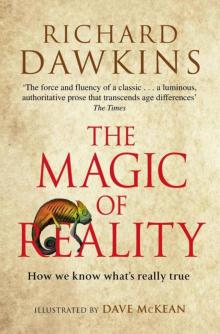 The Magic of Reality
The Magic of Reality The Extended Phenotype
The Extended Phenotype The God Delusion
The God Delusion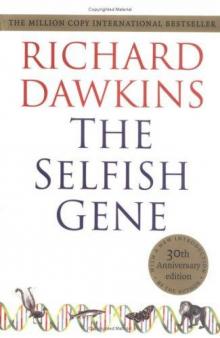 The Selfish Gene
The Selfish Gene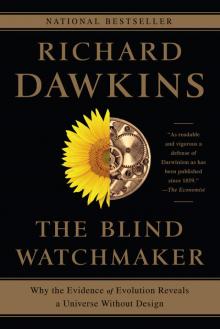 The Blind Watchmaker
The Blind Watchmaker The Greatest Show on Earth
The Greatest Show on Earth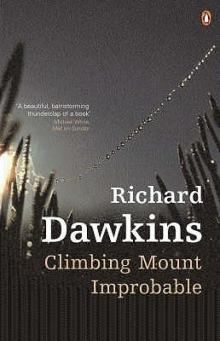 Climbing Mount Improbable
Climbing Mount Improbable Outgrowing God
Outgrowing God Brief Candle in the Dark
Brief Candle in the Dark The Greatest Show on Earth: The Evidence for Evolution
The Greatest Show on Earth: The Evidence for Evolution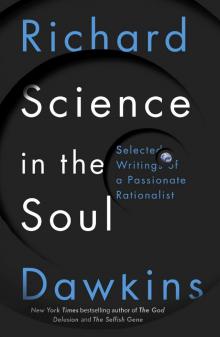 Science in the Soul
Science in the Soul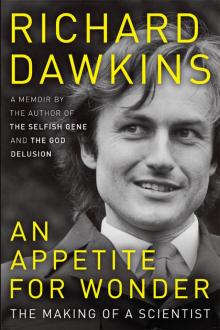 An Appetite for Wonder
An Appetite for Wonder